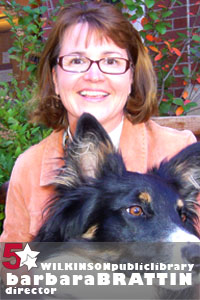
11 Nov FIVE STARS: AMERICAN STORYTELLING TRADITION
Editor’s note: Year after year, the Library Journal Index of Public Library Services, a public library rating system, has designated Telluride’s Library a five-star institution. And we just earned our fifth star in a row, which puts The Wilkinson Public Library into an elite club of 30 libraries that have seen stars five years in a row and third in the nation among public libraries with annual budgets of $1 – 5 million, hence the name of library director Barb Brattin’s semi-regular column, “Five Stars.”
Recently, I heard a piece on NPR describing how Americans have adjusted their means of communication in Afghanistan, where literacy rates are low and people rely on an oral tradition. There, individuals are expected to speak face to face, not through memos or emails or other forms of faceless communication. Eye contact and a handshake are baseline tools for friendships and business interactions.
Here in America, we have a long oral tradition that has seen its ups and downs. After hundreds of years of gatherings to share information and pass on histories, the Internet introduced the option to soak ourselves in an ocean of information in isolation from one another. As our Internet speed increased, society’s speed followed. The screen replaced the book. Our attention spans shrank. Even here at the Wilkinson Public Library, we choose to email staff members right outside our door. Teens were observed chatting online with another teen one computer over.
Libraries were once quiet places where people remained solitary among strangers and friends alike. They took books and DVDs home to enjoy, also in isolation. Then along came technology, which empowered our lives with real-time information. More and more workers opted to telecommute, replacing commuting time with free time. But something was missing. America had obviously reached a tipping point. We started to get itchy. Libraries began to see growing numbers of telecommuters in our meeting rooms, people opting to work in a public place. Program attendance began to climb. Book clubs sprouted. Isolation had begun to lose its luster.
Now I believe America is on a straight trajectory back to its oral storytelling tradition and that’s having a huge effect on library services and spaces. Library meeting rooms are packed: attendance at the Wilkinson’s programs triple annually. At national conferences librarians talk about community engagement projects, deliberative dialogue, and public conversations series. There is a renewed hunger to share information, to digest and evaluate it as a group, and to enrich the experience through shared perspectives. There is a desire to exchange stories and even more to create stories together through the written word, film, and music. A new sense of community is building within library spaces that looks back as it look ahead.
There is an enormously important opportunity for public libraries to embrace this renewed longing for the oral tradition. Joseph Campbell talked about the human story as being essential to the human psyche. Man’s hunger to understand his place in the world, he said, is satisfied by living through another man’s story. Each of us needs to hear, experience, and understand the hero’s journey. That is especially true for our youth who must navigate an ever more complicated world. They must read and hear the classic stories that give them the hope and courage to overcome the inevitable obstacles they will face.
William Faulkner, in his Nobel Prize acceptance speech, talked about the critical role of the human story this way:
“I believe that man will not merely endure: he will prevail. He is immortal, not because he alone among creatures has an inexhaustible voice, but because he has a soul, a spirit capable of compassion and sacrifice and endurance. The poet’s, the writer’s, duty is to write about these things. It is his privilege to help man endure by lifting his heart, by reminding him of the courage and honor and hope and pride and compassion and pity and sacrifice which have been the glory of his past. The poet’s voice need not merely be the record of man, it can be one of the props, the pillars to help him endure and prevail.”
As librarians it is an honor to serve as keepers of the human story.
May that motivating force be with you.



Amy Cannon
Posted at 09:59h, 12 NovemberHopeful, uplifting and inspiring, Barbara, thank you for this piece. Your dedication to preserve this tradition is helpful to me to read this cold morning.
admin
Posted at 12:17h, 12 NovemberWe along with Barb thank you for your response Amy. Happy her post warmed you like a toddy.